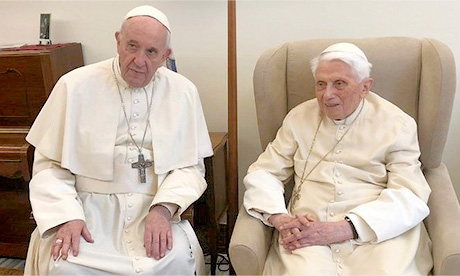We are living in a unique moment in church history with an ex-pope, properly credited for having the courage to resign when the problems he faced became overwhelming, living within the Vatican walls.
The resignation is best interpreted as Benedict XVI’s act of generosity toward the church.
The graciousness Francis has displayed toward his predecessor is equally an act of generosity.
Increasingly, however, Francis must also be calling on the virtue of patience to deal with the interference of a predecessor whose retirement has gone from a promised “life dedicated to prayer” to a life of backseat pontificating.
The most recent – and perhaps most unfortunate – intervention was Benedict’s letter theorizing on the causes of the sexual abuse crisis and, of course, defending his role in dealing with it.
That the latest was not a one-off, but part of a pattern that was pointed out by NCR Vatican Correspondent Joshua McElwee in reporting on the letter.
In November 2016 a book-length interview was published in which Benedict defended his eight-year papacy, saying he didn’t see himself as a failure.
In March of that same year he inserted himself into a Francis initiative when he did an interview in which he expounded on God’s mercy while Francis was in the midst of an Extraordinary Jubilee Year, with mercy as its central theme.
These interventions may appear anodyne to some, but they set a terrible precedent, making the perception or reality of a rivalry between the former pope and his acolytes and the incumbent pope and his supporters more likely.
Benedict’s latest interjection landed within shouting distance of a recent and first-of-its-kind international gathering of bishop leaders from around the globe to discuss the abuse crisis and seemed, unlike previous interventions, an act of sabotage, intended or not.
The growing consensus that characteristics of the secretive hierarchical culture are at the heart of the current crisis was given expression forcefully and repeatedly at the meeting.
It has taken the hierarchy of the global church nearly three and a half decades to reach that level of honesty about itself.
Benedict’s theology and exegesis in his latest letter aside, his analysis of the causes of the crisis — the turbulent 1960s, the sexual revolution, the various forces of modernity, the deficiencies in seminary training — would, if made the basis for understanding the scandal, turn the church back decades. Continue reading
- Image: Vatican News
